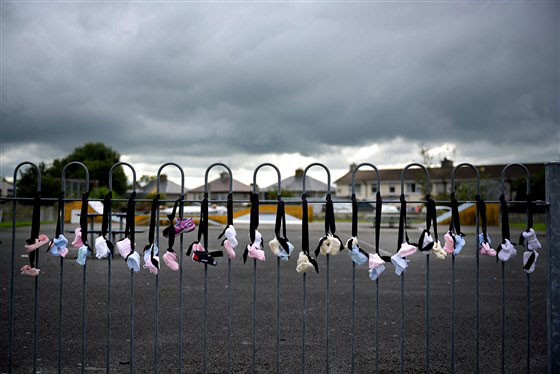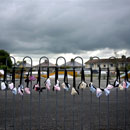 |
|---|
| Infant and baby shoes are hung along the playground fence as a vigil is held at the Tuam Mother and Baby home mass burial site on Aug. 25, 2019 in Tuam, Ireland. |
 
|
Some 9,000 children died in Ireland's church-run homes for unwed mothers
NBC News
Tue January 12, 2021
Some 9,000 children died in Ireland's church-run homes for unwed mothers, a government report published on Tuesday found. This is equivalent to 15 percent of all children who were born or lived in the 18 institutions investigated over nearly 80 years.
The nearly 3,000-page report describes the emotional and even physical abuse some of the 56,000 unmarried mothers - from farmhands to domestic servants - were subjected to in the so-called mother-and-baby homes.
"It appears that there was little kindness shown to them and this was particularly the case when they were giving birth," the report said.
The homes, many run by nuns and members of the Roman Catholic Church, operated in Ireland for most of the 20th century, with the last home closing as recently as 1998. They received state funding and also acted as adoption agencies — with many of the children adopted to families in the United States.
The report found the responsibility for the harsh treatment of women who gave birth outside of marriage rested mainly with their own immediate families. However, it added that treatment was supported and contributed to by the "institutions of the state and the churches."
According to anonymous accounts in the report, women giving birth were sometimes "verbally insulted, degraded and even slapped."
"We did this to ourselves, we treated women exceptionally badly," Ireland's Taoiseach, or prime minister, Micheál Martin, told reporters Tuesday after the report was published. "One hard truth in all of this, is that all of society was complicit in it," he added.
The report also noted the "appalling" rate of infant mortality in the homes, calling it "probably the most disquieting feature of these institutions."
In the years before 1960, it said, mother-and-baby homes did not save the lives of "illegitimate" children — instead, they significantly reduced prospects of their survival.
It did not include one single explanation for the high rates of mortality.
Instead, Martin said the report revealed "significant failures of the state and of society," and hoped the publication would be a catalyst for social change.
One religious order, the Sisters of the Sacred Hearts of Jesus and Mary, which ran three of the homes investigated in the report, said in a statement to NBC News on Tuesday that it welcomed the publication.
"For our part, we want to sincerely apologize to those who did not get the care and support they needed and deserved," the statement said.
Adding, "It is a matter of great sorrow to us that babies died while under our care."
The Commission of Investigation Into Mother and Baby Homes, which carried out the five-year inquiry, also looked at allegations that some children in the homes were used in vaccine trials with no parental consent for their participation.
The report identified seven such vaccine trials, which involved "a number of children," that took place from 1934 to 1973 in the homes.
A former resident of one of the homes spoke with NBC News and said she was used as a "guinea pig" for vaccines at a home in Cork, before being adopted by a family in Philadelphia in 1961.
The report said consent was not obtained from either the children's mothers or their guardians and the necessary licenses were not in place during the trials.
The mother-and-baby homes took in women, some as young as 12, who had become pregnant outside marriage — taboo in the conservative country — and were viewed as an attempt to preserve the country's devout Catholic image. Now, the homes are a byword for a dark chapter in the nation's history, say Irish politicians and survivors.
An amateur local historian, Catherine Corless, first shed light on the issue of maltreatment at the homes.
She discovered an unmarked mass graveyard at Tuam, in the western county of Galway, which prompted an investigation that uncovered the remains of at least 700 children buried from 1925 to 1961, a report found in 2017.
Ahead of publication, details of Tuesday's report were leaked to the media, prompting outrage from the victims — including mother-and-baby home survivor Philomena Lee, whose story was portrayed in a 2013 movie, starring Dame Judi Dench.
Ireland has traditionally been a Catholic stronghold, but decades of abuse scandals have damaged the church's reputation and weakened its influence.
Pope Francis begged forgiveness for the mother-and-baby homes scandal during his first papal visit to the country in almost four decades in 2018.
NBC News has not yet received a response to a request for comment from the Vatican.
Although compensation for the survivors was not explicitly outlined in the report, the Irish government said it would provide financial recognition to specific groups, yet to be determined.
It also said it would work with survivors and representative groups to oversee a national memorial, changes to Ireland's education curriculum and provide counseling support.
Leader Martin is due to issue a formal apology to the victims on behalf of the state on Wednesday.


 Share your thoughts in the Forum
Share your thoughts in the Forum